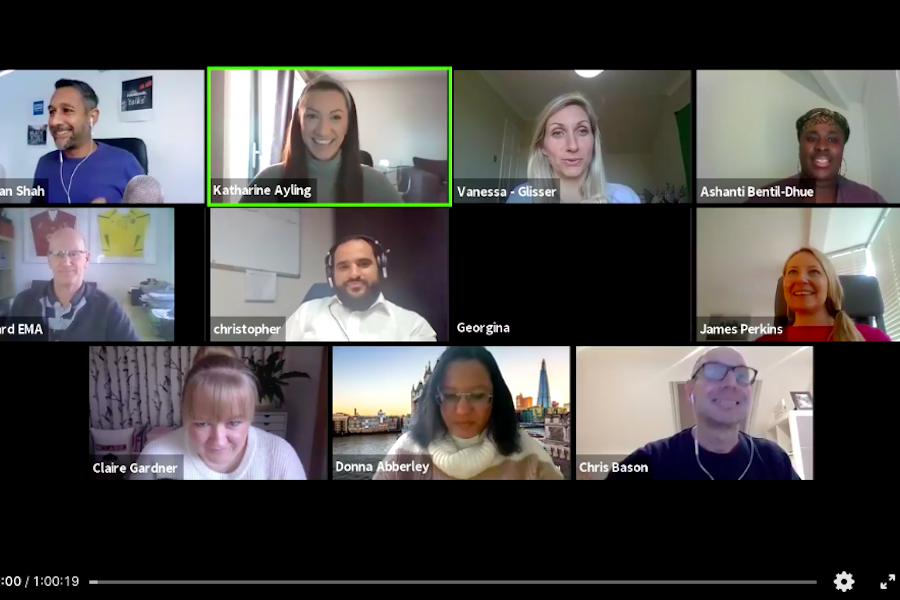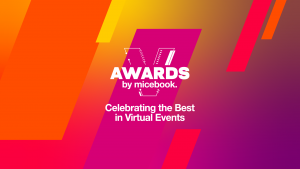To kick off our month-long focus on all things hybrid and virtual events, last week’s micebook talks session went back to basics. Our panel featuring Glisser’s Vanessa Lovatt, EventMind’s Ashanti Bentil-Dhue and freelance event specialist Katharine Ayling explained some of the key terminology and how to go about finding the right virtual platform. Here’s a few of the key takeaways…
What is a virtual event?
Bentil-Dhue described virtual events as “Bringing people together for a common reason or interest to achieve a particular purpose in a virtual environment.” She added: “Microsoft Teams or Zoom calls are not virtual events. They are tools – they are enablers and facilitate meetings and events in the virtual world.”
What is a hybrid event?
Our panel agreed that in a nutshell, hybrid events are when you have some people attending a live setting and others taking part via a virtual platform. Lovatt explained that hybrid events can generally be put into one of the following four categories:
Hybrid-lite – this is where you have the speakers in the room together, so you start to get that human engagement piece with the speakers, but your attendees are virtual. It’s a nice way to transition into hybrid as it’s a much lower risk. And it’s becoming easier as lots of venues are starting to create virtual studios now, so you can broadcast your speakers from a more glamorous backdrop.
Hybrid-proper – this is where you have some speakers in the room, some speakers virtually, some attendees in the room and some attendees virtually, and some sponsors in the room and some sponsors virtually. A “proper” hybrid event takes a lot of event design and event planning to execute an event like this.
Multi-hub – on top of having live and virtual speakers and audiences, you have multiple real-life venues across different geographical locations. This takes a lot of technical production and know how.
Hybrid-Echo – live activity takes place and is recorded and then streamed for virtual viewing at a later time/date. That takes all of the risk-factor out of full hybrid but also takes a lot of the opportunities for engagement and community. It could be a good transitional step to trialling hybrid.
Researching event platforms
Lovatt said: “The most important thing is to work out your event goals first and understand your event audience and what they need and want. Once you’ve done that, you can put together the list of features you need in a platform, and only then, should you go and look for a platform.”
Bentil-Dhue agreed: “If you focus on the platform first, you can end up getting confused and there is a paralysis that happens as there are so many options available. You might end up wasting money because what you have invested in doesn’t serve your purpose. Nothing has really changed – you need to approach a virtual event in the same way you would have planned an in-person event. These are just tools that help you to achieve your event’s purpose….. The more complicated your event is, the harder it is to backtrack and try and make a platform fit what you want it to do. For example, one client had bought a platform that didn’t do multi-track, and yet they designed a whole multi-track event so then we had to customise the platform, which is much more complicated.”
What questions should you be asking?
“You need to understand how much customer support they are going to provide. Some platform providers are better than others. Ask how much support do you provide once we have paid for the licence? What does that support look like? Is that an email inbox? Is someone there who can help in a live event situation when something goes wrong?,” said Bentil-Dhue.
“Another key question to ask is are there any hidden costs? For example, some of the pricing structures don’t include streaming in their basic cost. If you want to have a branded break-out room, is there an additional cost. If you want to record your live streams – is there an additional cost?”
Lovatt added that data and analytics and security are also key areas to investigate. “Find out what security measures they have in place? Have they been through rigorous testing? What are they doing with your data? How are they keeping it secure?”
Are you a Virtual Agency, Platform, Experience or Studio? Then register your services here:


